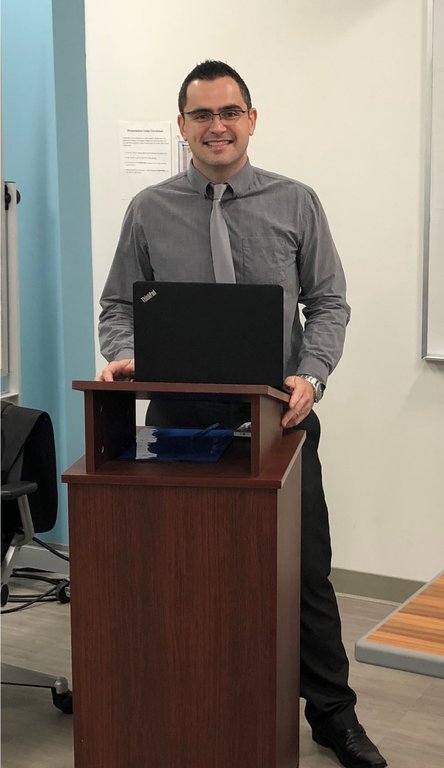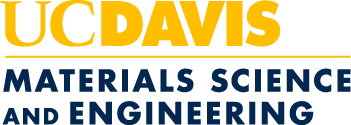Applications for priority review are due January 15, 2026.
Read the full list of degree requirements for more information.
Take Your Knowledge to the Highest Level at UC Davis
About the Doctoral Degree
The doctoral (Ph.D.) degree prepares students to solve complex, long-term research problems. You can expect to graduate in four to five years and to work on a large research project, culminating in a dissertation. The majority of our doctoral graduates end up in industry careers or at national labs, usually in research and product development positions. Others go on to careers in academia, either as a postdoctoral researcher or an assistant professor. Check out the "After UC Davis" page for examples of where some of our graduates have found employment.
Degree Requirements
Doctoral students complete the same core courses as the master’s degree students, but have additional examinations along the way that test both the breadth and depth of their materials science and engineering knowledge. Over the course of your first fall quarter, you will be matched with a major professor through the "Preparing for Graduate Student Success" course (EMS 200). The six core classes mentioned above are listed below:
- EMS 260: Advanced Thermodynamics of Solids
- EMS 262: Advanced Topics in Structure of Materials
- EMS 264: Transport Phenomena in Materials Processes
- EMS 268: Advanced Materials Characterization
- EMS 272: Advanced Functional Properties of Materials
- EMS 274: Advanced Mechanical Properties of Materials
For electives, you can select from any available upper-division undergraduate course (courses numbered 100-199) or graduate level course (courses numbered 200-299) in a science or engineering discipline. Doctoral students are encouraged to select any physics, chemistry, mathematics or engineering-related courses that will assist them in preparing for their candidacy,
You are also expected to enroll in EMS 290: "Department Seminar" every quarter during your first year of graduate study. The course requires students to attend a majority of the weekly departmental lectures by visiting scholars in the field, exposing them to the latest advances in materials science and engineering.
Sample schedule, years 1 and 2 (full-time student)
| Fall | Winter | Spring | |||
|---|---|---|---|---|---|
| EMS 260 | 4 | EMS 272 | 4 | EMS 268 | 4 |
| EMS 262 | 4 | EMS 274 | 4 | EMS 299: Research | 8 |
| EMS 264 | 4 | Elective (1XX/2XX) | 3 | EMS 290 | 1 |
| EMS 200 | 1 | EMS 290 | 1 | Preliminary Exam | |
| EMS 290 | 1 |
| Fall | Winter | Spring | |||
|---|---|---|---|---|---|
| Elective (1XX/2XX) | 3 | Elective (1XX/2XX) | 3 | EMS 299 | 12 |
| EMS 299 | 9 | EMS 299 | 9 | Qualifying Exam | |
| Advance to Candidacy | |||||
A program of study form is available to help with planning the course schedule. In years three and four, students will enroll in 12 units of research (EMS 299) each quarter and begin working on dissertation research and writing until graduation at the end of year four or five. Check out the full list of degree requirements for more information. For students who matriculated Fall 2019 or earlier, please see the 2011 degree requirements.
Transferring coursework
Graduate-level coursework completed at another institution may be substituted for elective or required coursework in some cases, depending on the content of the course. If a graduate-level course was taken during the student’s undergraduate degree program, you must prove that the course was not used to satisfy the bachelor’s degree requirements. Transferred courses are evaluated through an internal process by the instructor of the course at UC Davis. If approved, the course is waived for the student. The waived course does not formally appear on the UC Davis transcript as a transferred course, but does appear on the internal Program of Study form as satisfying the course requirements for the degree.
To learn more about transferring course work please go to Graduate Studies webpage on the topic.
Preliminary exam
Taken in the spring quarter of your first year, this exam consists of a 15-minute presentation followed by 20 minutes of questioning by a committee consisting of five faculty members. The presentation should be a critical literature review of two to three papers selected from a pre-determined list of 10-12 papers. The committee, which will be the same for all students, will question the student on the presentation and its relation to the fundamental knowledge of Materials Science and Engineering topics. The overall goal of this exam is to determine whether the student has mastered the subject matter in Materials Science and Engineering at a level appropriate for the doctoral degree and that the student has the ability to integrate basic concepts across subject areas. In order to be eligible to take the exam, the student must have completed all core courses and maintain at least a 3.25 GPA in the core courses.
Qualifying exam

The qualifying exam contains both a written and an oral portion. The written portion consists of a 10-15 page dissertation research proposal and bibliography that follows a format similar to an NSF or NIH grant proposal. After distributing the proposal to the committee, the student prepares a 30-35 minute oral presentation, during which a faculty committee will question the student. The qualifying exam committee consists of four graduate program faculty members and one external faculty member. Major professors are not allowed to participate on the qualifying exam committee.
Teaching assistant requirement
All doctoral students are required to serve as a 25% (avg. of 10 hours per week) teaching assistant at least three times over the course of their graduate career. While one of these times may be a reader, the intention of this requirement is to expose doctoral students to one facet of a career in academia and education.
Exit seminar
After you complete your dissertation, you will present your research to the department prior to scheduling an appointment with Graduate Studies to submit your dissertation. At least two of your dissertation committee members must be present at the exit seminar. Prior to the exit seminar, doctoral students should schedule a meeting with their dissertation committee to discuss their dissertation. If the seminar is successfully completed, the committee will sign off on the dissertation signature page. Note that electronic signatures are being accepted in lieu of original signatures due to the COVID-19 pandemic.
Designated emphases (DE)
As a doctoral student, you have the unique opportunity to participate in an affiliated designated emphasis (DE). A DE is similar in concept to an undergraduate minor. You will be required to complete additional coursework and must have a faculty member from that DE serve on both the qualifying exam committee and the dissertation committee. Students who successfully complete the DE will have a notation included on their diploma and transcript. The Materials Science and Engineering graduate program is affiliated with three designated emphases:

